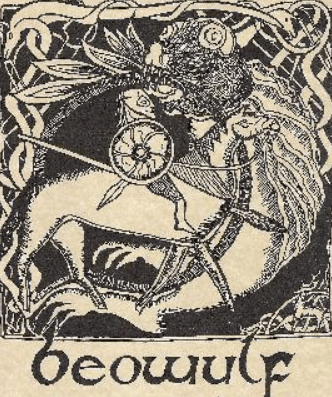Guest Blogger and long-time Council friend, Bob W. presents Part 25 of a series dealing with Alcoholism and Addiction from a Mystical, Mythological Perspective, reflecting Bob’s scholarly work as a Ph.D. in mythological studies.
There is an Old English tale called Beowulf, set in the Early Middle Ages in Scandanavia. It is a mythic story about a warrior of that name, called to help the Danish king Hrothgar whose palace is under attack by the monster Grendel. 
In this story, I am reminded that, for many of us alcoholics and addicts, our lifelong journey to Sobriety really does have two parts. The first is getting sober, just stopping the consumption of alcohol or drugs or the high risk behavior patterns that have the same effect. We have to stop it all completely and work with those in the Fellowships to help us achieve some semblance of a sober life that can last for more than a few days or weeks. This first step is usually achieved with some success in a matter of months or a few years.
But like Beowulf’s second battle against Grendel’s Mother, the second part of our journey can be much, much harder. For, after achieving that first level of sobriety, we have to deal with all those elements of ourselves that influenced and facilitated the descent into alcoholism in the first place. We must explore the deep core of who we are and what might have happened to us in our early lives to create the trauma that craved the medicating toxic substances or behaviors. These explorations might be especially difficult and not without much personal suffering.
In Beowulf, the hero must venture down into Grendel’s Mother’s lair, in a deep and dark cavern under a lake. The battle with her is particularly difficult, with much back and forth of Beowulf gaining the upper hand and then losing it. Beowulf finally wins using the monster’s own sword, but in dismembering her body and that of Grendel, this sword is dissolved by the toxic blood of the monsters. Beowulf returns to the surface with only the hilt of the sword and the dismembered monster heads to reveal to Hrothgar and his subjects his true victory over the monsters.
For many of us, these images conjure up our own journeys down into some latent darkness and our own titanic battles with demons, core remembrances that seem like evil forces within us. The disparate nature of these things and their ability to derail our quest for sanity and serenity can be real and present…maybe on an ongoing basis in our journeys to sobriety. Our initial victories may not seem to have the finality that is present in this epic story.
But, with the help of the Fellowships to which we attach ourselves, we learn how to deal with them day by day by day by day…and eventually we begin to take their power away. The ultimate effect becomes much more lasting and the victories of Beowulf over Grendel and his Mother do begin to represent that of our own successes. We can eventually present the dismembered heads of our own demons to our peers in recovery with a sense of satisfaction and serenity.
